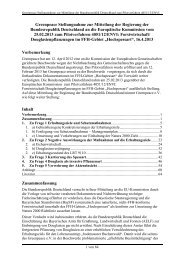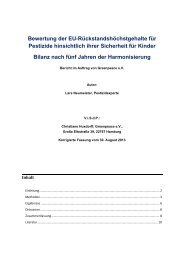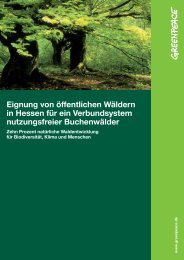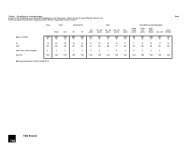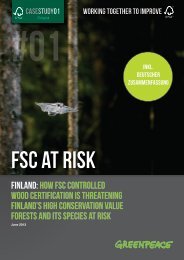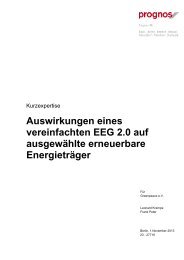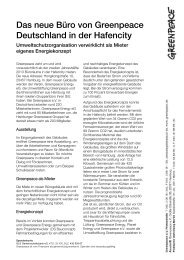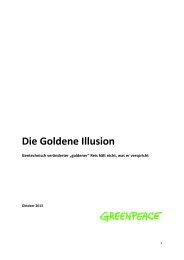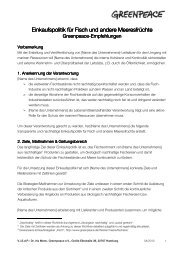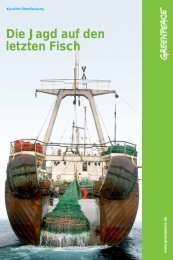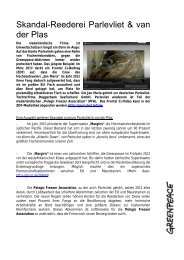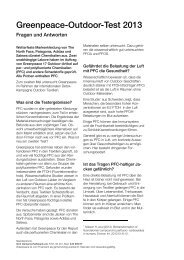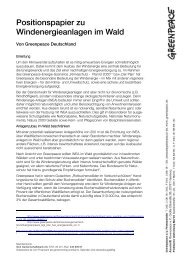Untitled - Greenpeace
Untitled - Greenpeace
Untitled - Greenpeace
You also want an ePaper? Increase the reach of your titles
YUMPU automatically turns print PDFs into web optimized ePapers that Google loves.
22<br />
CARVING UP THE CONGO<br />
WITHOUT ENFORCEMENT, WORLD<br />
BANK-LED FORESTRY INITIATIVES<br />
CAN MAKE POVERTY WORSE<br />
The World Bank states that good governance<br />
and anti-corruption are central to poverty<br />
alleviation.<br />
The World Bank congratulates itself for the<br />
April 2002 (tax) review which cancelled<br />
forestry titles covering 25 million hectares. Its<br />
online Q & A celebrates this ‘cancellation of<br />
non-compliant concessions [sic]’ as ‘an<br />
unprecedented move anywhere in the world’,<br />
critical to ‘slow[ing] the expansion of logging’<br />
and ‘free[ing] up space for potential new<br />
protected areas in the rainforest part of the<br />
country.’ 103 In fact, in the absence of good<br />
governance, the cancellation of non-compliant<br />
titles has freed up space for new, predatory<br />
logging operations.<br />
The key initiatives introduced by the World<br />
Bank to regain control of the industrial logging<br />
industry – the moratorium on the allocation of<br />
new forest holdings, the legal review of current<br />
forest holdings, and the Forestry Code<br />
governing the management of the forest – are<br />
set to fail because they do not challenge the<br />
corruption that characterises business and<br />
politics in the DRC. The legal review’s narrow<br />
scope (which may not even be rigorously<br />
applied), the failure to enact decrees to<br />
implement the key social and environmental<br />
provisions of the Forestry Code, and the<br />
absence of mechanisms to enforce both the<br />
Forestry Code and the moratorium and to<br />
penalise infractions, all contribute to undermine<br />
forestry reform.<br />
While few new areas have been protected since<br />
the 2002 moratorium, the DRC Government<br />
has signed logging contracts for new titles<br />
(new allocations), new title boundaries<br />
(extended titles), and renewal of existing titles.<br />
In some cases, new contracts have been signed<br />
for titles in areas previously occupied by ‘noncompliant<br />
titles’, many of them in intact forest<br />
landscapes. Apparent examples include CFT,<br />
Forabola, ITB, Sicobois, Sodefor, and Trans-M. 104<br />
The legal review – another World Bank-led<br />
attempt to bring the logging industry in the<br />
DRC under control – also looks set to endorse<br />
the de facto expansion of industrial logging.<br />
The remit of this legal review amounts to a<br />
paper review. Beyond payment of tax and the<br />
title having been obtained following due<br />
process, to pass the legal review a logging title<br />
must ‘[comply] with boundaries as defined by<br />
the contract and the topographical map<br />
attached to said contract’.<br />
This is a critical issue because many companies<br />
(eg Sodefor and Siforco) handed back forest<br />
post-2002 when taxes were set to increase.<br />
They may have been granted new (updated)<br />
contracts at this stage to reflect the change<br />
and may have taken the opportunity to redraw<br />
their boundaries. This means that companies<br />
will have had the opportunity to effectively<br />
launder new forest holdings through the legal<br />
paper review (no on the ground checks have<br />
been possible).<br />
The potential bypassing of due process to gain<br />
new forest holdings is a governance,<br />
environmental and a social issue. On the latter<br />
©<strong>Greenpeace</strong>/Davison<br />
‘Contrary to the moratorium<br />
on such contracts, in early<br />
2003 concessions covering<br />
6-9 million hectares were<br />
allocated by mutual<br />
agreement (allocation de gré<br />
à gré), and certain contracts<br />
that had been cancelled in<br />
April 2002 were reinstated,<br />
by way of exception, in<br />
early 2004.’ 105<br />
Government of the DRC, 2004



